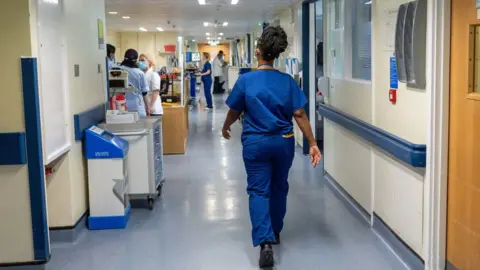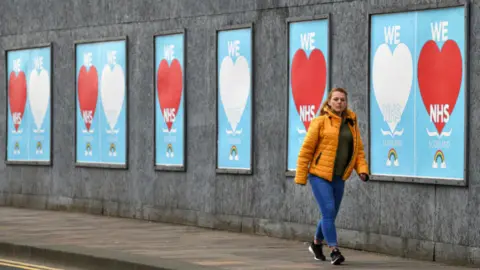NHS is in crisis - but are we being sold poor health?

 PA Media
PA Media- Aged 75, the NHS is in poor health. Experts say its priorities should include more capacity, more staff, and an end to short-term or wishful thinking.
- It also needs to manage the demands placed on it. That should include better public health and fewer unhealthy choices by current and future patients.
- An extraordinary edition of The Lancet has pointed the finger of blame at business, in many forms, for selling us products that make us unhealthy and in undermining health services worldwide.
As a general rule, anyone wishing to win your vote is not going to be wholly truthful about the National Health Service. Maybe that's a bad reflection on politicians. Or maybe it's because of you, or us... or let's say, the public.
We tend not to vote for people who tell us things we don't want to hear.
People who don't need your vote, and who don't have to reassure you that everything's going to be all right, are somewhat more likely to break the bad news that the NHS needs to change. And that may not be popular with the public or with more than a million NHS workers.
That would include the Auditor General, with regular warnings to the Scottish government that the current system is unsustainable.
It includes expert think tanks. Three of them, based in London and much more attuned to the English NHS, have said as much this week.
The King's Fund, the Nuffield Trust and the Health Foundation jointly said support for the NHS is "rock solid", but nothing else is. It's in "critical condition", "pressures are extreme" and public satisfaction levels have been falling.
Scotland, Wales and Northern Ireland have used devolved powers to diverge from England, and in many ways to protect services from a series of upheavals in the way England's health service has been managed. Yet many of the indicators and challenges are very similar.
Good will stretched
Ex-cabinet ministers, this week including Tony Blair and former Chancellor Sajid Javid, become a lot more candid when they're no longer seeking votes.
The former Labour prime minister wrote of the case for health service reform that embraces technology and mixes with the private sector more readily.
The former Tory chancellor and health secretary said that senior figures privately admit what they cannot say in public - that the NHS gobbles an ever-larger share of government spending, but still can't meet surging demand.
And as it has been resistant to change for decades, the health outcomes in Britain - including avoidable deaths - are higher than those of comparable countries.
Javid said the "politicisation of the NHS severely deters serious discussions about the problems it faces, let alone the potential solutions to them. It is also a barrier to serious reform and a driver of short-term thinking. This self-imposed caution extends to both voters and politicians, and it is letting patients and staff down."
Its 75th anniversary this week saw current political leaders go to Westminster Abbey to give thanks and pay homage at the altar of a health service described by one former chancellor as the closest thing Britain has to a national religion.
Some people joked darkly about those present going there to pray that it will get to its centenary.
 Getty Images
Getty ImagesThe easy hit, for politicians and for media interviewers, is to measure commitment in financial terms. In terms of securing resources, it's highly successful, and with budgets always strained, that's at the expense of other public services.
But health service inflation consistently rises faster than other inflation indices. Expectations rise of what the service can provide and of what medical professionals and science can achieve. The technology and pharmaceutical options build faster than the Treasury can keep up with.
That's in addition to the demographic challenge which is no longer ahead, but now breaking over it, and as it struggles to recover from the toughest challenge it has ever faced.
The Covid-19 pandemic created huge backlogs. Through putting stress on the workforce, that pressure cleared out thousands of people that the service now needs, along with a pension incentive (now removed) for well-paid doctors to retire early.
Goodwill and a social contract have been a feature of the health service workforce for 75 years, but they are being sorely tested. Waves of unprecedented strikes, over pay but fuelled by frustration at the state of the NHS, show how frayed that relationship has become.
More beds
Those three health think tanks have set out four ways this needs to be addressed, each of them requiring an end to short-term fixes and the making of unachievable pledges.
One is to invest in the hardware the NHS needs. This would follow years of capital budgets being raided for day-to-day spending. That includes equipment, buildings, new technology and "beds", which is shorthand for capacity.
One of the striking differences with comparable countries is that they carry far more spare capacity for spikes in demand, while the NHS barely handles the pressures each winter, and is still struggling to recover from the pandemic.
They say there has to be "long overdue reform of adult social care". Scotland's answer to that has been a National Care Service - a plan which has been parked, or at least postponed by Humza Yousaf, because it failed to carry professional or political support.
 Getty Images
Getty ImagesThe extra funding to make such reform adequate to the task and challenge will likely have to come from Westminster, so the whole UK has an interest in Downing Street finding a social care solution for England.
But Downing Street politicians keep being burned by the issue. Theresa May's 2017 re-election efforts came unstuck over social care. Boris Johnson promised a plan and boldly announced one, but it crumbled.
A prime minister committed to make it work will have to spend a lot of political capital on it.
Managing demand
The think tanks' further demand is for workforce planning and a sustained commitment behind it. The NHS has an enormous problem with vacancies.
It hasn't been training enough medical professionals. Many that it does train go overseas. So it depends on recruitment from overseas, which became more difficult post-Brexit, and which strips out important human resources from developing nations.
One solution to the costs and shortage of staffing, to the growing need for social care and to the capacity problem is to use technology in smarter ways.
In the health service, tech can mean higher costs, as scanning and procedures require more equipment, and as pharmaceutical provides ever more expensive drugs.
Technology can also provide more efficiency and more attractive options - monitoring of people and their vital signs while they remain at home.
Tony Blair proposes an NHS app, on which you could see your medical records and which links to a monitoring device like a FitBit, providing personalised advice on lifestyle changes that could improve your health.
That sounds like it could be an irritating intrusion into one's privacy, and the right to an unhealthy lifestyle. But hang on a moment, because the final part of the think tank prescription is "to commit to a cross-government strategy over the course of the next parliament to improve the underlying social and economic conditions that shape the health of the nation".
This is where the future of the NHS can be decisively shaped and saved - not in clinics or surgeries or reform with better quality management, but in 'demand management'.
Poor choices
Pressures on the NHS come from unhealthy people. Many ailments are unavoidable, but many can be avoided.
Many chronic ailments are due to choices, to drink excessively, to smoke, to eat too much unhealthy food and not take enough exercise. (I plead guilty on the latter two.)
Many lifestyle health problems come from a lack of choice, and are the result of circumstance: being and feeling trapped in poor quality housing, directly linking to poverty, people being unable to source healthy food at affordable prices, of limited education and, in mental health, of poor quality relationships.
You can argue where the role for individual responsibility fits into this, but the public health evidence draws an incontrovertible link from poverty to poor health. It points to anti-poverty measures as among the best ways of reducing pressures on the health service in the long term.
And where people don't make the right choices for their health, the evidence drives public health experts towards much stronger restriction and regulation of the choices available to us.
Banning indoor smoking in public places was an important breakthrough in that, and advertising of tobacco has been severely curtailed.
Alcohol licensing is already regulated, in the times and places booze can be bought and, in Scotland, at a minimum price per unit.
So you can probably see the direction of travel which brought us the plans for a ban on advertising alcohol in Scotland - again, plans which were deemed to go too far, or too fast, and which have been parked under Humza Yousaf's leadership at Holyrood.
If Holyrood hasn't lost its thirst for them, restrictions may return, but in a diluted form, allowing for branding in pubs and at distillery visitor centres.
Meal deals
What, then, of food? In England, Wales and Scotland, there are plans to restrict promotions of food deemed to have too much fat, sugar or salt, and often all three.
But only in Cardiff are politicians pushing ahead with a ban on meal deals and multi-buy offers featuring unhealthy food .
Elsewhere, it's looking too politically difficult. Food manufacturers and retailers will push back. The public don't want to be nannied.

But the challenge remains, and if not down to regulation, then perhaps it's down to personal and collective choice.
The NHS is ours. It's accountable to us. You can argue that its problems come from the politicians who control it, fund it, steer it and reform it. But its biggest challenge is... us, the patients.
The Biblical proverb 'physician, heal thyself' should perhaps be extended to patients.
Or, as John F Kennedy didn't quite say, this may be a time to ask not what your NHS can do for you, but what you can do for the NHS.
Deadly industries
However, there's another way of looking at this. If not curtailing personal choice, what about putting the onus for healthier lifestyles on to the commercial interests which encourage them?
An extraordinary edition of The Lancet medical magazine recently published a series of articles tearing into the global industries which make their money from activities which bring ill-health.
It seeks to capture a school of thinking around 'the commercial determinants of health', or CDOH. A definition had previously been hard to nail down, but it offers this broad-ranging one: 'the systems, practices and pathways through which commercial actors drive health and equity".
The series was compiled by academics from 15 countries on six continents, led from the University of Melbourne. It starts with a previous calculation that the four big killer industries - alcohol, tobacco, ultra-processed food and fossil fuels - are responsible for at least a third of global deaths each year.
 PA Media
PA MediaIt builds on that, with less conservative assumptions about the effects not only of obesity but of unhealthy diets as a whole, adding many millions of deaths from air pollution due to the burning of fossil fuels, and reaches a figure of 58% of the world's deaths being due to commercial activities, or 78% of deaths not caused by communicable disease.
It further argues that around 70% of influences on health come from external factors rather than unpreventable conditions and disease.
It claims to be pro-health rather than anti-business. It concedes, briefly, that business can play a positive role, as when lenders pulled out of financing the tobacco industry. The definition allows for a positive outcome, just and extends beyond 'big' business to all sorts of commercial interests.
Policy inertia
Most of it is a ferocious attack on the profit motive. That extends, via poor air quality, to the oil and gas industry being bad for the planet's health. Tech giants are criticised for their social media platforms being a driver of poor mental health.
The critique extends, worldwide, to the effect of big business, and the people who run it and earn from its dividends, on lobbying to reduce tax rates. That, in turn, reduces the funds for health services which are necessary to mitigate the effects of... yes, big business.
Either that or, it argues, health systems are subject to capture by commercial interests, from health insurance companies to big pharma, which uses big lawyers to put big constraints on the selling of drugs to poorer people in poorer countries.
And taken together, the result is 'policy inertia'. Nothing gets changed. This is a reminder that Britain may have a unique set of issues, with its proudly unique National Health Service, but nowhere do they find it easy to run and fund adequate health services for all.
Developing nations are finding it a lot more difficult than the richer ones, not only because of cost but because so the global economic system tends to locate the most harmful processes, such as mining and manufacturing, in countries with the least ability to regulate and resist.
This thinking is strongly ideological, and can be dismissed as such. But its publication in The Lancet gives it status within mainstream medical thinking. At least it can act as a reminder that the economic system is itself an ideology, and a series of choices rather than a natural state.
It casts a new light on the question of private involvement in the health service. Where private provision can be seen as an answer to failing public services (or as a menace to be resisted), the private sector as a whole can also be seen as the cause.
And that raises the question of how much health-polluting business should be expected to pay for so-called 'externalities' - the effects of its behaviour on society, health and environment.
